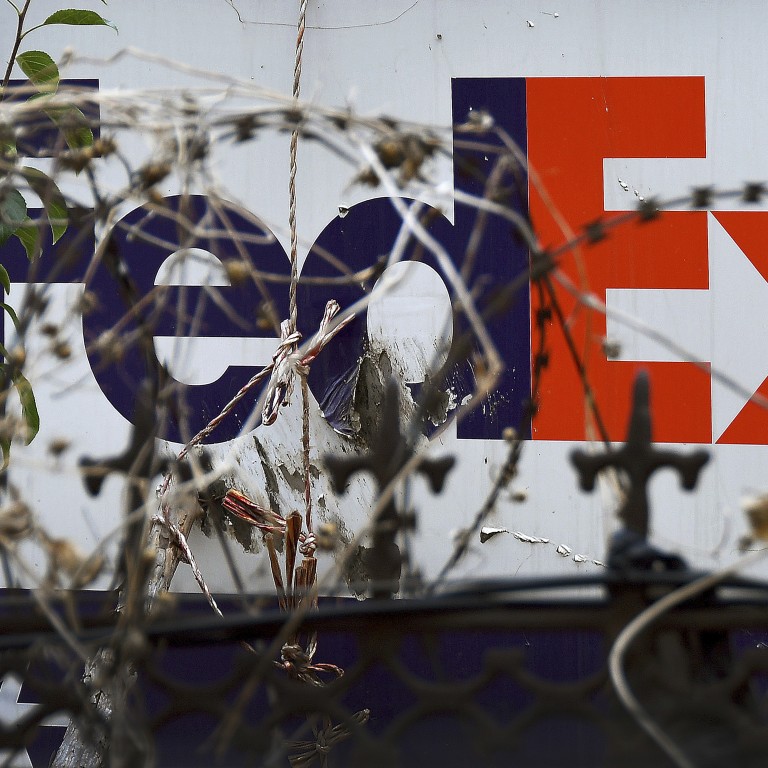
FedEx seeks to defuse its latest delivery mishap in China, this time involving a firearm, saying it notified police two months ago
- In the latest case, a United States client sent a handgun via FedEx to a sports good company in the Fujian provincial capital of Fuzhou, Xinhua News Agency reported on Sunday
- FedEx had already reported the case to Chinese authorities two months agon on June 14, according to a FedEx statement
FedEx Corporation, under pressure in China over its diversions of packages from Huawei Technologies, is seeking to defuse a delivery mishap involving a firearm, as it seeks to protect its market position amid rising tension in the US-China trade war.
In the latest case, a United States client sent a handgun via FedEx to a sports good company in the Fujian provincial capital of Fuzhou, Xinhua News Agency reported on Sunday. The firearm never made it to the sporting goods company and was seized by local police, who are investigating the incident.
“We notified the [Chinese] authorities about this [handgun] shipment on June 14,” a FedEx spokeswoman said in a Monday statement, without divulging the names of the consignor, the recipient or a description of the firearm. “We take this matter seriously, and will continue to fully cooperate.”
The episode comes as FedEx, operating in China since 1995, is under increasing pressure to be put on the Chinese government’s list of “unreliable foreign entities” as its policies and actions were deemed as being hostile to China’s national interests. The Chinese Ministry of Commerce, responsible for compiling the list, has said it is still in the process of preparation and declined to comment on specifics, even as Chinese state media published commentary calling for FedEx to be put on the list.
On Sunday, Fuzhou Public Security Bureau’s publicity department confirmed the authenticity of a report by state news agency Xinhua of a firearm being seized from a FedEx shipment, but declined to provide further details, including the name of the sporting goods company.
Chinese police investigate delivery of handgun from US to China via FedEx
Xinhua condemned FedEx in a commentary soon after its report was published on Sunday evening.
“Since the US government put Huawei on its so-called entity list in May this year, FedEx has repeatedly messed about with Huawei’s deliveries,” according to a commentary on Xinhua. “FedEx has threatened China’s national security and has violated Chinese law. These are not accidental business mistakes, but lawbreaking offences.”
Firearms are strictly controlled in China, with private ownership generally banned except in limited circumstances. Transporting firearms in China is illegal without prior approval and requires permits by security officials.
FedEx, which does not break out results for its Asia-Pacific operations, has made deliveries in China since 1995, when it acquired cargo air routes from Evergreen International Aviation.
The company operates a 873,000 square foot sorting and handling facility at its Asia-Pacific hub at Guangzhou Baiyun International Airport in Guangzhou that can sort 56,000 packages an hour, according to its annual report. FedEx has a lease on the facility that runs through 2029.
The reports of the handgun episode came just days after the US announced that it had added China’s biggest state-owned nuclear firm, China General Nuclear Power Group, to its own “entity list”, which prohibits US companies from doing business with foreign entities without a special licence.
Shenzhen-based Huawei has found itself at the centre of the US-China trade war that has raged for the past year after the US moved in May to blacklist the Chinese telecommunications company and its subsidiaries from buying US technology.
Citing an unidentified US administration official, The Wall Street Journal reported earlier in the day that the US Commerce Department was planning on Monday to grant a 90-day extension to a licence that has allowed Huawei to continue doing business in the US. But, US President Donald Trump told US reporters on Sunday that he did not want to do business with Huawei “because it is a national security threat.”

